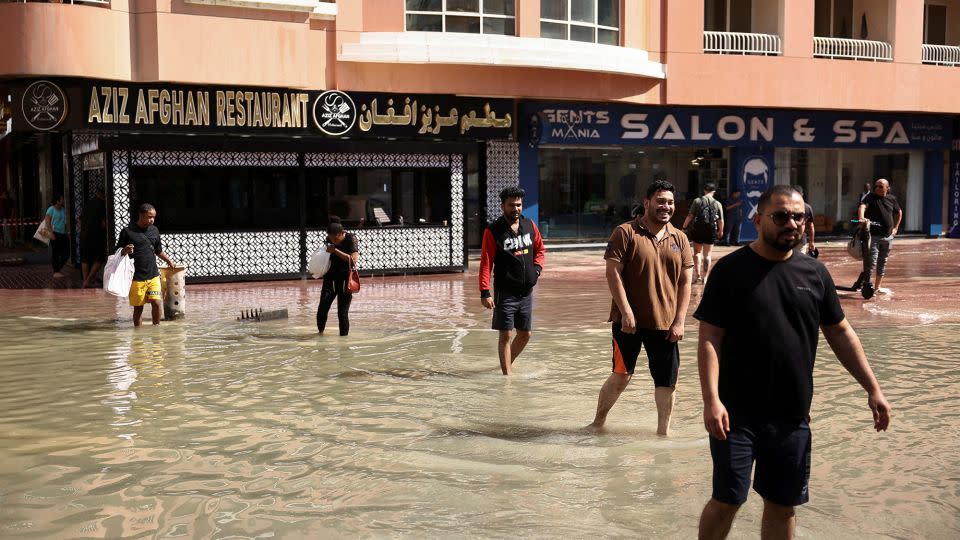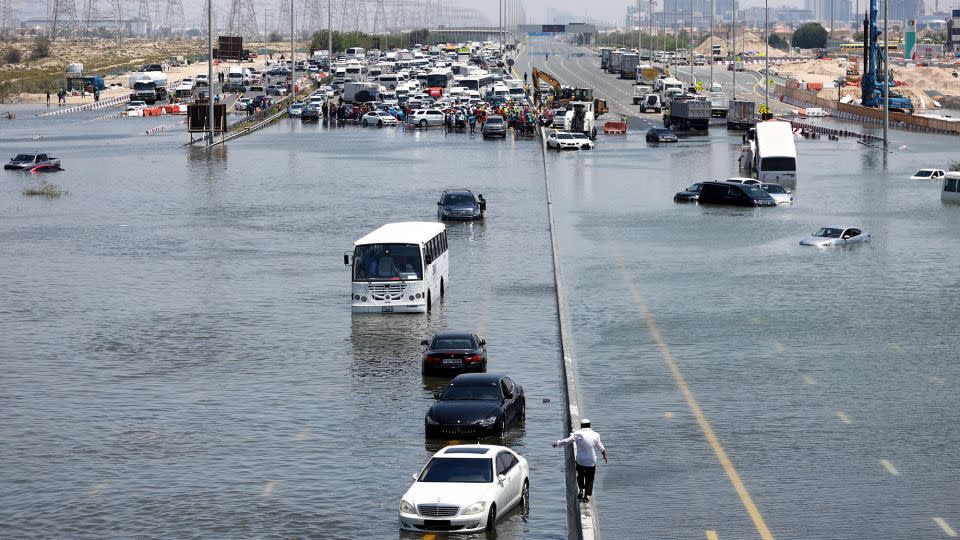The record-breaking rain that fell on the United Arab Emirates and Oman this month, triggering deadly floods and chaos, was partly caused by the climate crisis, according to a scientific analysis published on Thursday that points directly to humans burning fossil fuels.
A team of 21 scientists and researchers as part of the World Weather Attribution initiative found that climate change is making extreme precipitation events (which typically fall during El Niño years) between 10% and 40% more intense in the two countries. global warming.
In less than 24 hours between April 14 and 15, the United Arab Emirates experienced the heaviest rainfall since records began 75 years ago. The analysis noted that Dubai, a glitzy desert city accustomed to going months without any precipitation, received the equivalent of more than a year and a half of rain during that period.
Using scientific models, the team was unable to determine exactly how likely climate change is to cause floods.
However, they concluded that global warming was the “most likely” cause of record rainfall because in a world that was 1.2 degrees warmer, the atmosphere could now hold 8.4% more moisture, making extreme rain events more intense. The analysis stated that changing circulation patterns due to global warming also increased precipitation intensity.
The only reason they could identify to explain the heavy downpour was global warming.
Floods killed four people in the UAE and at least 19 in Oman; Among them were 10 children whose school bus was flooded. Extreme weather conditions have caused flooding in several parts of the UAE, which can be seen in satellite images from space.
The floods also caused widespread disruption in Dubai. More than 1,000 flights to and from Dubai airport, the world’s second busiest, were canceled and days of delays followed. People had to abandon their vehicles on flooded roads. Three Filipino women working in Dubai died after being trapped in their car under water gushing from the street.
Leaks broke out in the city’s luxury shopping malls as rainwater seeped through ceilings, and elevators in skyscrapers stopped working, forcing residents to climb stairs to dozens of floors. Some drivers, who could not return home due to the closure of the roads, slept in their vehicles.

“Floods in the UAE and Oman have shown that even arid regions can be strongly affected by rainfall events, a threat that increases with increasing global warming due to the burning of fossil fuels,” said Sonia Seneviratne, a professor at the Institute of Atmospheric and Climate Science. in Zurich.
Mansour Almazroui, from the Center of Excellence for Climate Change Research at King Abdulaziz University in Jeddah, Saudi Arabia, said the heavy rain in the two countries came from two separate, powerful storm systems.
He added that record ocean temperatures played a role in overloading the storms.
“The Indian Ocean is warming. And high pressure in the Indian Ocean is definitely contributing to the rainfall,” he told reporters.
The Arabian Peninsula, which includes the UAE and Oman, occasionally experiences bouts of heavy rain in April and May from several storms that act together as a single weather system, known as mesoscale convective systems.
Friederike OttoSenior Lecturer in Climate Science at the Grantham Institute in London said studies had pointed out that the frequency of these storms was increasing.
Otto said El Niño, a natural oscillation in ocean temperatures that affects global weather, was also a driving factor in the April rain event. But he added that the focus should be on slowing climate change.
“Even though we can’t stop El Niño, we can stop climate change,” Otto said. “The solution is to stop burning fossil fuels, stop deforestation,” he said. Deforestation is responsible for at least 12% of global carbon pollution.


As CNN previously reported, the UAE’s state-owned energy company ADNOC has plans to greatly expand oil and gas production. The country was widely criticized for choosing ADNOC CEO Sultan Al-Jaber to chair UN-backed international climate talks in Dubai last year.
The talks achieved some success; Almost every country agreed that the world needed to move away from fossil fuels.
But many fossil fuel-rich countries still extract large amounts of planet-warming coal, oil and gas, and some even plan to explore for more oil and build new infrastructure. The International Energy Agency has said the world must end new fossil fuel projects if it wants to limit global warming to 1.5 degrees Celsius, a global science-based target at the heart of the 2015 Paris Agreement.
Almost six months after the climate talks, “countries are still opening new oil and gas fields,” Otto said. “If the world continues to burn fossil fuels, rainfall will become increasingly heavy in many parts of the world, leading to deadlier and more devastating floods.”
CNN’s Abbas Al Lawati contributed to this report from Dubai.
For more CNN news and newsletters, create an account at CNN.com